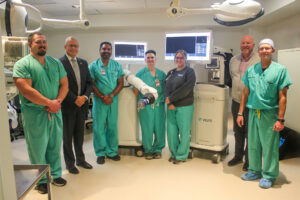Robotic assistance platform from VELYS™ Spine will tailor surgical guidance to surgeon preference and patient needs
Hillsdale Hospital recently installed robotic technology from the VELYS™ Active Robotic Assistance Platform to provide tailored surgical guidance for spine care. In coordination with its advanced navigation platform, the hybrid robotic arm will equip spine surgeons at Hillsdale Hospital to provide more advanced surgical care. The hospital is the first institution in Michigan and among the first ten in the country to acquire this system.
“We have a phenomenal group of surgeons, nurses, techs and other team members who support our community with excellent surgical care. This robotic assistance platform will help them go even farther in ensuring each patient receives the absolute best,” said Jeremiah J. Hodshire, president and chief executive officer.

L to R: Jeff Sherman, Prosource Services Representative; JJ Hodshire, Hillsdale Hospital President & CEO; Dr. Amritraj Loganathan, Neurosurgeon; Nicole Salloum, PA; Lauren Schneider, Hillsdale Hospital Director of Surgical Services; Gerald Simpson, Prosource Services Founder & CEO; Joshua Martin, Midwest Digital Spine Specialist, DePuy Synthes
The VELYS™ Active Robotic Assistance Platform addresses the uniquely complex needs of spine surgeons, allowing for surgeon-guided manual arm movement and autonomous alignment. It is designed to support a range of back and neck procedures with adaptive tracking by continuously adjusting to movements of the surgical site, maintaining proper alignment relative to the plan. While the majority of neurosurgical robots function as static first generation systems, this active next generation robot allows for more complex spinal deformity cases as well as increased customization capabilities.
“The surgical team is proud to support Hillsdale Hospital’s mission, vision and purpose of ensuring our region has access to a full range of quality health services close to home,” said Lauren Schneider, director of surgical services, quality improvement and assurance. “It is remarkable that we can provide this advanced technology to our rural community.”
Spinal conditions are among the leading causes of chronic pain and disability, affecting millions worldwide.[i] Back and neck pain can severely limit movement, disrupting daily activities and affecting mental health.[ii] Research shows that 40 percent of adults age 40 and over experience spinal degeneration, a number that rises to 80 percent by age 80.[iii]
“Having the new VELYS™ Spine robot is an amazing thing for my patients and the Hillsdale community,” said Dr. Amritraj Loganathan, neurosurgeon at Hillsdale Hospital. “It is helping us provide excellent accuracy in instrumentation placement during surgeries, and it’s exciting to know we have the most advanced piece of technology that exists for spine surgery.”
The surgical team at Hillsdale Hospital has conducted several surgeries with this technology since its installation, and each one has been successful.
To learn more about neurosurgical care at Hillsdale Hospital, visit hillsdalehospital.com/neurosurgery.
[i] World Health Organization Website. https://www.who.int/news-room/fact-sheets/detail/low-back-pain
[ii] Kumagai, G., Wada, K., Kudo, H. et al. The effect of low back pain and neck-shoulder stiffness on health-related quality of life: a cross-sectional population-based study. BMC Musculoskelet Disord.
[iii] Medical Advisory Secretariat. Artificial discs for lumbar and cervical degenerative disc disease -update: an evidence-based analysis. Ont Health Technol Assess Ser. 2006;6(10):1-98.
